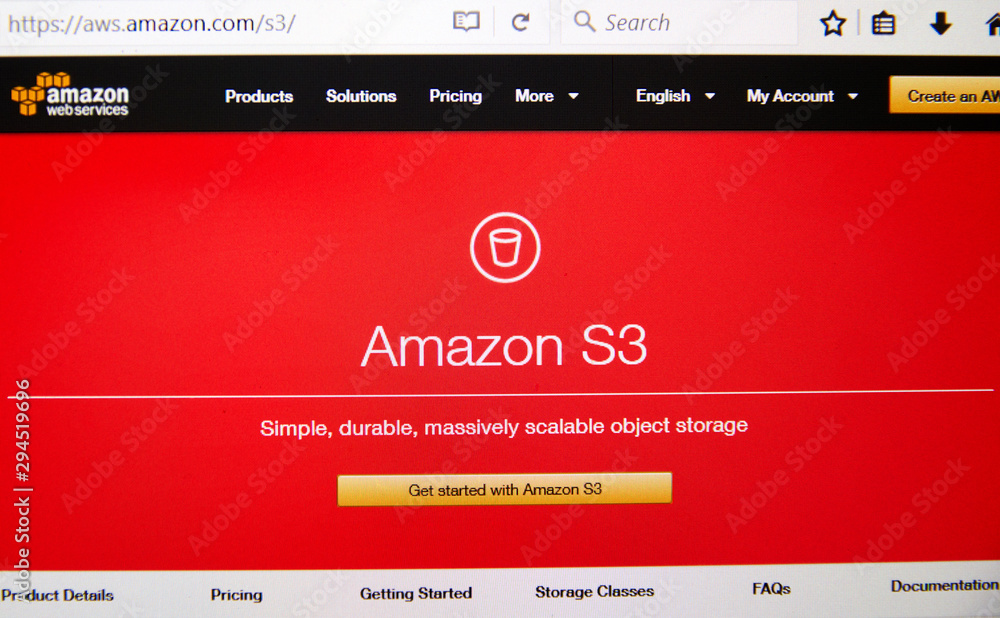Amazon Simple Storage Service (Amazon S3) provides safe and secure object storage with high scalability, availability, performance, and durability. You can use Amazon S3 to simplify data storage and management in various use cases.
Amazon S3 Architecture
Amazon S3 stores data as objects inside containers known as buckets. One bucket can contain multiple objects, and an object inside a bucket will have a unique identification key (name). You first need to create an S3 bucket specifying a name and the region and upload the data. Then the data will be accessible using a bucket URL.
AWS S3 also provides different storage tiers to store data based on their access pattern.
If the access pattern is not known, Amazon S3 intelligent tiering lets customers automatically migrate the data within different storage classes, and S3 lifecycle configuration help to store objects cost-effectively throughout their lifecycle.
Amazon S3 Use Cases
Static Website Hosting
If you have a static website hosted on a web server, you can reduce its costs by hosting it in Amazon S3. It lets you configure an S3 bucket for static website hosting and apply permissions to access the website without having a web server. You can use a custom domain name registered with Amazon route 53 and point to the S3 bucket. In addition, you can use CloudFront to deliver static content with low latency to the users, as illustrated in the figure below.
Backup and Disaster Recovery
Data backup is important for any organization to restore data in case of any database failures. AWS S3 offers reliable and durable storage for data backups while keeping costs low. It offers 99.999999999% durability and up to 99.99% availability through cross-region replication, eliminating a single point of failure. In addition, S3 versioning enables you to recover the files, and you can use MFA delete to avoid accidental data deletion.
Data lake and big data analytics
Big data analytics is an integral part of many companies for generating business value from their data to move forward with the business. They can use Amazon S3 to build a data lake cost-effectively and scale according to the storage demand. Using data lake, customers can use other AWS services to execute big data analytics, machine learning (ML), and other high-performance computing applications.
Data Archiving
Industries like healthcare, banking, medical organizations are often required to store data for a long period to meet compliance and regulatory requirements. Amazon S3 provides low-cost Glacier and Glacier Deep Archive storage tiers for simplifying long-term data archival, which supports many security standards. Also, you have the option to retrieve the data within 1-5 minutes.
Besides the above use cases, you can use mobile Amazon S3 for many other applications, including mobile applications and IoT devices. Let’s see how Bristol Myers Squibb, a global pharmaceutical company that develops innovative medicines, uses S3 to manage big scientific data.
How Bristol Myers Squibb has simplified their business using S3
Bristol Myers Squibb has petabytes of Genomics and clinical data, which they collect from various external sources. They have built data pipelines and stored those scientific data in Amazon S3 in a data lake. The company then integrated Amazon Athena, Amazon EMR, and AWS Glue to query and analyze the data lake and derive important scientific insights.
S3 architecture has immensely helped them to organize their data in many S3 buckets based on different criteria. S3 s’ unlimited storage has enabled them to hold millions of data, including life science images. Also, using the S3 tagging system, they can quickly search through large amounts of data.
Because S3 is highly scalable, the company has leveraged many high-performance computing tasks, including data visualization, storing data streams, and research needs. Moreover, they do not worry about moving data to reduce costs because Amazon takes care of that using Amazon S3 intelligent tiering and lifecycle policies.
Summary
In summary, Amazon S3 is one of the most intelligent storage services with high scalability, availability, performance, and durability. As we discussed in this article, there are many use cases in which businesses can leverage the power of S3. You can also integrate many AWS services and on-premises data to cost-efficiently manage your big data.
